Ellipsis: Examples and Meaning
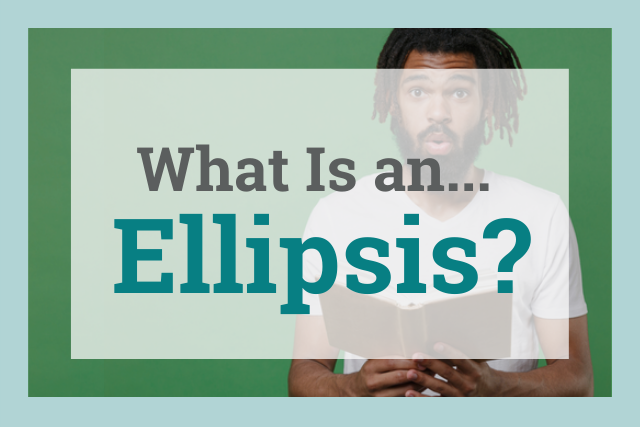
When it comes to English grammar, no other form of punctuation has been as thoroughly abused and misused as the ellipsis.
The ellipsis (plural ellipses) originally served very specific functions. Like all features of language, the uses have evolved over time. Still, the correct usage of ellipses, whether formal or informal, seems to elude many people, even writers!
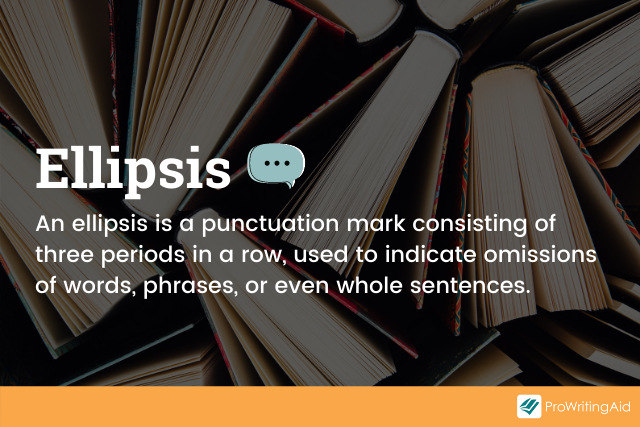
What Is an Ellipsis?
Dot dot dot.
In short, that’s what an ellipsis is or, at least, that’s how we write it. An ellipsis is a punctuation mark consisting of three periods in a row. The word ellipsis comes from an ancient Greek word that means “to leave out.”
We use ellipses to indicate omissions of words, phrases, or even whole sentences. This is always true for formal uses of the ellipsis. Staunch grammarians will tell you that this is the only acceptable use for ellipses and that any other uses, like the trailing off of thoughts, are wildly incorrect.
The truth is: language has always had formal and informal uses, and language evolves. Punctuation marks are an important part of language. Just like comma rules have changed over time, so, too, has the acceptable use of ellipses.
But some rules still exist. Can an ellipses ever be two dots? Can you use more than three dots to indicate a longer omission or pause in thoughts?
No. An ellipsis is always only three periods. Spacing rules differ among style guides, as do rules about other punctuation marks next to the ellipsis. But the hard and fast rule is that you can only write an ellipsis like so: ...
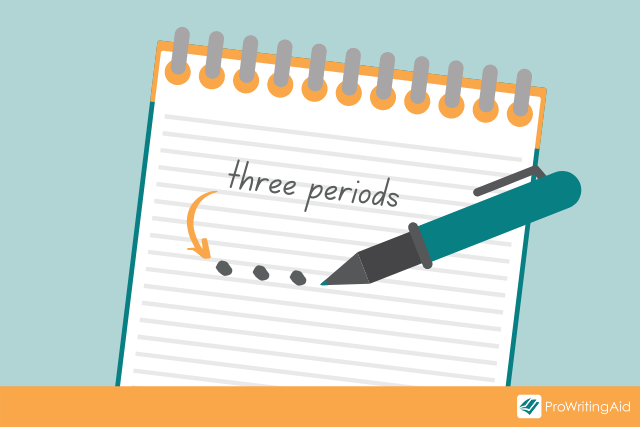
How Do I Use an Ellipsis Correctly?
If you asked your high-school English teacher, they would tell you there is only one way to correctly use ellipses: to leave out words or phrases from quotations. It would look something like this:
- “It is a truth...that a single man in possession of a good fortune, must be in want of a wife.” — Jane Austen, Pride and Prejudice
In this quote, we omitted the words “universally acknowledged.” But this is only the formal way to use an ellipsis. We’ll take a look at the correct ways to write with ellipses in both formal and informal English.
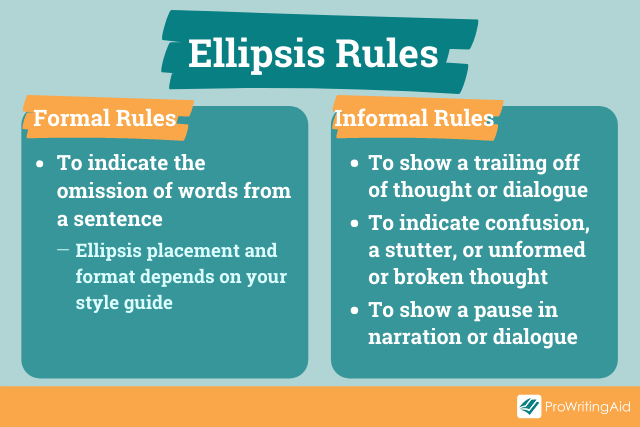
Punctuation in Formal Writing
Often when we quote things in our writing, we want or need to shorten the quote. This is why we use ellipses in formal writing. The ellipses in the middle of a quotation indicate that we have omitted a word, phrase, sentence, or even several sentences.
Let’s say you are writing about racial equality, and you want to use part of Abraham Lincoln’s Gettysburg Address. Here is the whole quote:
- “Four score and seven years ago, our fathers brought forth on this continent, a new nation, conceived in Liberty, and dedicated to the proposition that all men are created equal.”
That’s a long quote, and it has more words than you might need just to talk about equality. You can use an ellipsis to shorten this quote to just the parts that address your topic. If you’re writing an essay, your sentence might look like this:
- In his Gettysburg Address of 1863, Abraham Lincoln said, “our fathers brought forth on this continent, a new nation...dedicated to the proposition that all men are created equal.”
The years since America’s founding and the phrase “conceived in Liberty” were not as relevant to the topic, so we omitted them.
Why didn’t we use ellipses at the beginning when we left out “four score and seven years ago” from our quote? You do not have to use an ellipsis to show that you left out words from the beginning of a quote because a quote can start anywhere. However, it is not incorrect to include them. This is a matter of style guide and personal preference.
We could have written the same sentence like this:
- In his Gettysburg Address of 1863, Abraham Lincoln said, “...our fathers brought forth on this continent, a new nation...dedicated to the proposition that all men are created equal.”
However, the rule that is certain is that we need an ellipsis to show the part of the middle of the quote that we omitted.
Do you need ellipses at the end of quotes? Again, this depends on the style guide you use and personal preference. If the quote ends with the end of a sentence, like our example above, ellipses are rarely used.
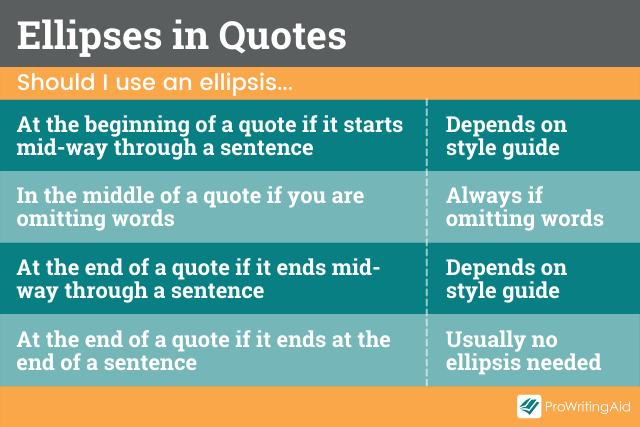
But what if you end the quote when the original text keeps going? You can choose to use an ellipsis at the end. This is required by certain style guides like MLA, while not required in others, like the Chicago Manual. You might also need to add a period after the ellipsis, which makes it look like four dots. Always check your style guide for the rule on this.
What would an ellipsis at the end of a quotation look like? Let’s look at another example from the Gettysburg Address.
Here’s the complete original sentence:
- The brave men, living and dead, who struggled here, have consecrated it, far above our poor power to add or detract.
If you only want the beginning of the sentence, you could write it one of these ways. It depends on the rules your style guide dictates.
- In regards to the consecration of the battlefield, Lincoln said, “The brave men, living and dead, who struggled here, have consecrated it….”
- In regards to the consecration of the battlefield, Lincoln said, “The brave men, living and dead, who struggled here, have consecrated it…”
- In regards to the consecration of the battlefield, Lincoln said, “The brave men, living and dead, who struggled here, have consecrated it.”
Please note that even though four dots are present in the first example above, this does not mean the ellipsis has four periods. It is an ellipsis plus a period.
Rules for Informal Writing
All it takes is a quick scroll through social media to see that ellipses have far more accepted uses these days than just omitting words. We aren’t often quoting things while leaving out words in our Instagram posts, text messages, and personal blogs.
The informal uses of ellipses seem to get more and more popular. Punctuation is just as important as word choice in sentence structure to establish tone, context, and intent. With a more online world, the written word has never been more important. And that means that language continues to evolve. The ellipsis is no exception.

In general, informal ellipses serve three main purposes:
- To show a trailing off of thought or dialogue
- To indicate confusion, a stutter, or unformed or broken thought
- To show a pause in narration or dialogue
Let’s look at each of these in more detail.
The most common use of an ellipsis in informal writing is to demonstrate a thought trailing off. We do this a lot when we speak, and an ellipsis helps accomplish the same tone in written form. Here are some examples:
- She sighed. “I just thought…never mind.”
- That’s not why I bought it. Anyway…
- His eyes welled with tears. “I don’t know what to do anymore. I never wanted…” He shook his head.
In Dreyer’s English, Benjamin Dryer says speech that is cut off should usually be indicated with a dash unless the character is clearly trailing off in a sort of dreamy way.
The second use is to mimic how people really think and speak. We don’t always speak in clear, exact, perfectly formed sentences. We get confused, we stutter. Our thoughts race and interrupt other speech.
- “I...I don’t know…I’m not sure what you mean.”
- “The boy turned the corner and saw the bully...was this too big to handle on his own or...maybe it was time to take a stand?”
- “When we first moved in together...or maybe it was when we first started dating...I was really jealous.”
We can also use the ellipsis to slow down pacing and demonstrate a pause in the narration. For example: “She wasn’t angry with him...she was simply exhausted.” We could have used a period or a semicolon or even an em-dash. But the ellipsis mimics the character’s exhaustion because it slows down the pacing.
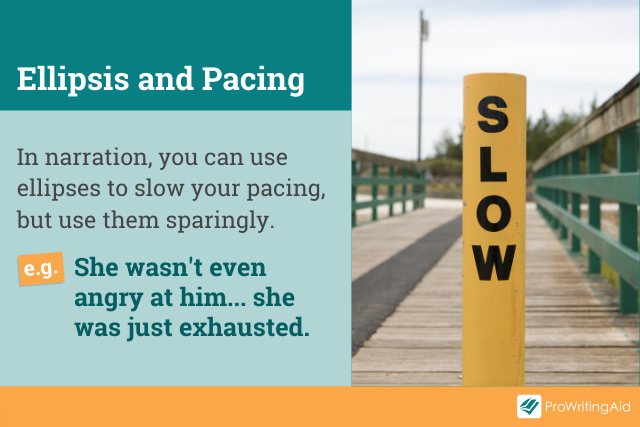
Like everything in the written word, ellipses can be overused. If you find that you are using them in every scene or multiple times in a blog post, consider mixing up the punctuation you are using. Because ellipses slow down our writing in a way that other punctuation does not, too many will make your writing seem dull. You may unintentionally create a tone that you did not want.
Additionally, in informal writing, ellipses rarely, if ever, show up with other punctuation marks except quotation marks. There is no need to put a comma before an ellipsis or a period after it because they aren’t being used to show omitted words.
And remember, an ellipsis only has three dots!
Academic Style Guide Punctuation Rules
Do you put spaces between the dots in an ellipsis? What about spaces before or after ellipses? The answer to these questions depends entirely on the style guide you are using. Here are a few examples.
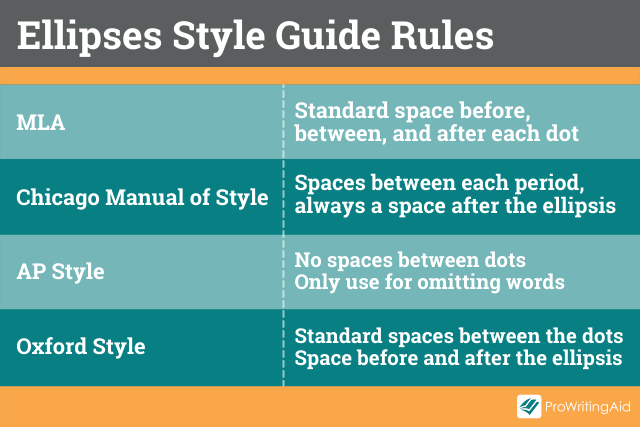
Chicago Manual of Style
Without spaces, the ellipsis is known as an “ellipsis character,” meaning it is one punctuation mark. Chicago prefers the ellipsis to be written with spaces between each period, and there is always a space after the ellipsis. However, they do allow for certain publishers to use smaller spaces than a standard space.
MLA Style
MLA requires that a standard space exist before, between, and after each dot in an ellipsis like this: . . .
To make things more confusing, MLA used to require ellipses that showed an omission to be surrounded by brackets like this: [ . . . ] The brackets are no longer required, but some people still use them, as they are not technically incorrect in the style guide.
AP Style
AP Style, most commonly used by journalists, indicates that no spaces should occur between the dots in ellipses. Spaces before or after the ellipsis should only be used if it is necessary to sufficiently separate them from other words. AP Style also says the ellipsis should only be used to condense quotations and not for any informal purposes.
Oxford Style
The Oxford Style Guide does not use standard spaces between the dots in an ellipsis, but it does require a space before and after the ellipsis. It is also acceptable to use smaller spaces between the dots, but never a full space. Add a period before the space and ellipsis if the words you are omitting occur between two complete sentences.
Other Style Guides
Those aren’t the only style guides that exist. Here are a few others you might come across.
Oxford University Style indicates that there should be no spaces before, after, or between the periods in an ellipsis.
Bluebook, which is the accepted legal style guide in the United States, uses full spaces before and between each period, and it may include a final punctuation mark after an ellipsis and a space. Omissions are often indicated with three asterisks (*), with or without spaces, to more clearly indicate that words have been redacted rather than illustrating pauses in dialogue.
But there are so many style guides out there. Much online writing that isn’t journalism has its own house rules. There are style guides for different academic journals and publishing styles. If you aren’t sure, ask your editor or publisher what style guide to reference.
If you’re writing for yourself, pick which spacing rules look the best to you. Just be consistent throughout your writing. Stick with one rule.
If you want to check the ellipsis formatting in your document quickly, ProWritingAid can help. The Consistency Report will highlight three-dot and ellipsis characters in your document so you can make sure you're using the same form throughout.

You'll also see if you have spelled or capitalized words inconsistently, or if you've used dashes and hyphens (so you can check you've used the right one).
The ellipsis is a versatile punctuation mark. Just remember to only use three dots and to never overuse any one form of punctuation.